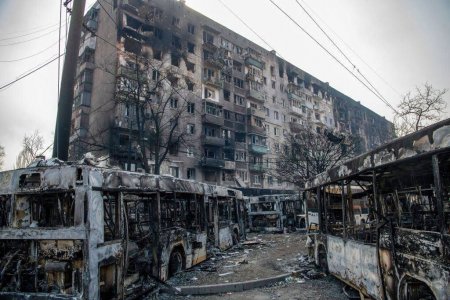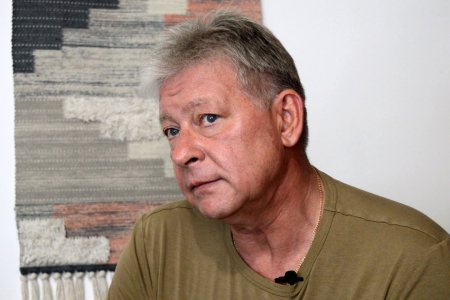
Photo illustrations by Evgeny Sosnovsky
My name is Evgeny Sosnovsky, I was born in 1964 in Mariupol, where I lived until 30 April, 2022. I was forced to leave the city after it was occupied by the Rashists. Before the war, I worked in the IT field, took photographs, performed in amateur theater. I had a normal comfortable life.
What do you remember about the first day of the war?
I woke up early. Recently, after waking up, I would immediately open my tablet and watch the latest news. We expected something to happen. And so, on 24 February, Putin declared war on Ukraine and the entire civilized world, calling it a military operation, decentralization and demilitarization. Of course, my first feeling was horror, but at that moment I was sure that it would not last very long. I thought this will end fairly quickly, because our European and American partners have always said that if Putin crosses the so-called red line, he will immediately receive a worthy response from them.
Putin did cross the red line, but only new sanctions were a worthy response at that time. Biden said that in a month these sanctions would have strong impact and should destroy the Russian economy, but we see now that Russian economy has a sufficient margin of safety. Although sanctions are working, that was not the response we expected. Still, despite the horror, we remained in the city. In addition, we had a sick bedridden grandmother and we could not travel with her at that time as we had no wheelchair.
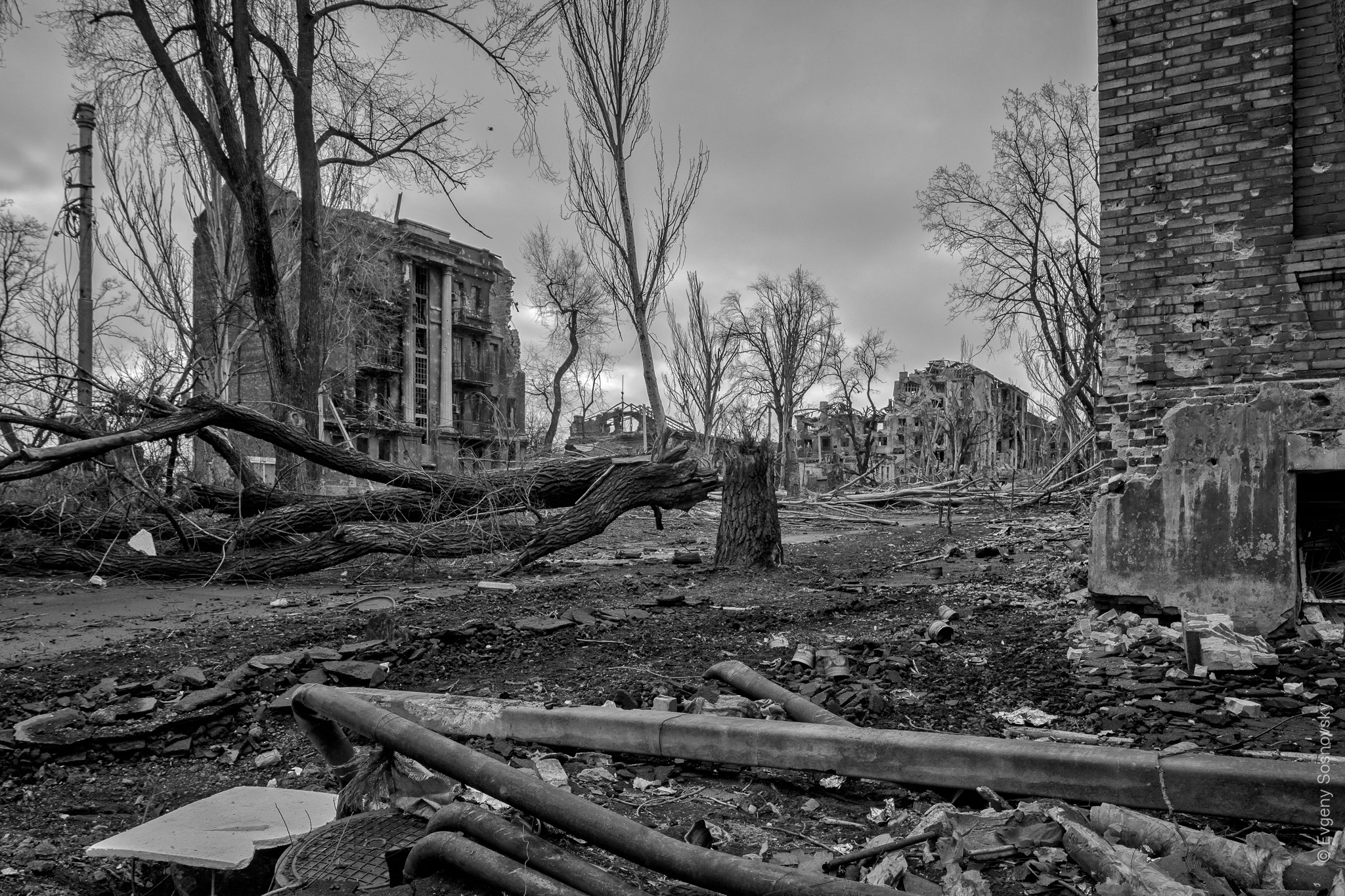
When did active hostilities begin in your area?
The first shelling in our area was on 3 March at about five in the evening. We were home when we heard the sound of shells whistling near us, and then explosions began. My wife and I hid in one of the rooms because we lived on the first floor and did not run to the basement. Also, we lived on the eastern side of the house: that is, on the side opposite from where the shelling was carried out. So, we stayed in the apartment, in the hallway. It was scary because explosions started right outside our house. We heard that somewhere nearby something was breaking, and some windows in our building were felling down. Our apartment had plastic windows, and they were more resistant to these blast waves. We were lucky as our house and yard remained almost unharmed, but the houses, literally a hundred meters from us, were damaged. I don't know what they were shooting with, these were not Grads, but some kind of shells, because the walls in the houses were pierced. An apartment on the seventh or sixth floor in one of the houses was on fire.
There were victims too: a shell flew into an apartment on the first floor, the father and child died there and the mother, as far as I know, was in serious condition, she was sent to the hospital.
The first attacks have already resulted in casualties. This shelling reminded me of the Vostochny shelling, which happened in January 2015 when shelling with Grads hit individual houses and apartments, but there was no significant destruction of the buildings themselves. This time it was similar, but it hit residential area and there were no military men near our houses. There was no military equipment near us, although we lived not very far from the Azovstal plant. Every day we had to leave our apartment at Metallurgov 85 which is the central avenue in Mariupol. My wife's mother lived nearby, also her brother with his wife and their daughter with two children. There were three small houses in one yard at 48 Yevpatoria Street. Every day we went there because we had no water and electricity in our apartment, but they had water in the basement that we could use. Also, it was easier to make a fire there as they had firewood in the private sector. We had to go there to feed my wife's mother and to help her with the household.
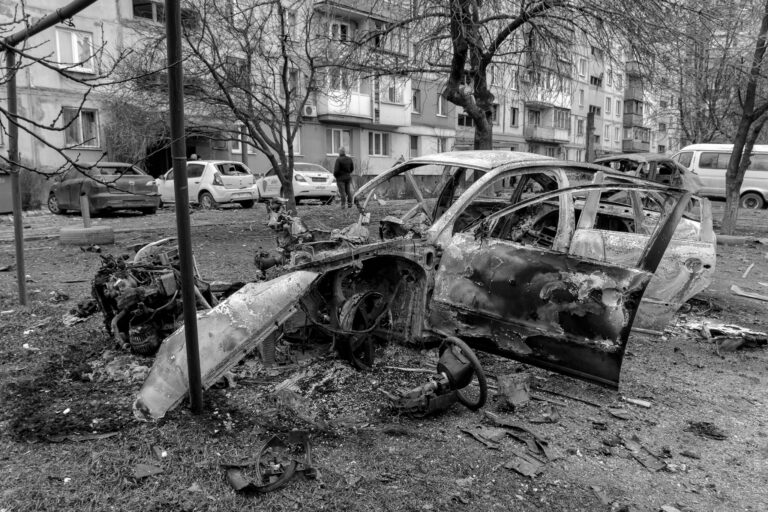
On 12 March we were returning home and, at the crossroads of Yevpatoria and Ilyich, we saw the No.66 school destroyed by a bomb. As far as I understood, it was an aerial bomb, it was impossible to inflict such destruction with a simple projectile. The front facade was leveled to the ground and it was one of the best schools in Mariupol. It has recently been restored and was well equipped. The school was excellent: my children and the children of our niece studied there. When we saw this school, it was, of course, a difficult sight, but it did not end there, the worst was yet to come.
Every day, several times a day, there were bombardments. They were directed towards Azovstal, but many shells exploded in the private sector, some near where our grandmother lived as it was even closer to the Azovstal plant than our apartment building. On 15 April, another shelling began, somewhere around two o'clock in the afternoon, if I'm not mistaken. The shells began to explode very near my grandmother's house. A shell exploded behind the neighbor's fence, I was outside and ran towards the house to make sure that my wife was safely insight. I ran into the house and asked my grandmother, "Is my wife Svetlana here?" She said, “No.” I wanted to run out into the yard to find her, but I didn’t have time to do this, because as soon as I rushed out of my grandmother’s room, a shell flew into our veranda. About a meter and a half to my right there was a small bathroom, and that's where the shell hit.
The explosion was powerful and covered me with stones from the walls and beams. There was only one piece of the wall left from the veranda, everything else broke down and fell on me. At first, I thought that this was the end, that I was already somewhere on the road to the next world, because I could not hear or see anything. However, eventually I began to move my arms and legs and realized that I was alive. I began to rake up the stones and everything that had fallen on me, and, finally, I saw a stream of light. Finally, I managed to get out from under a pile of stones, but there was some kind of yellow fog and an unpleasant smell around. I did not understand anything, but went forward and finally ran into a shed which help me to orient myself and realize where I was. From the shed I went to the house of my wife's brother; the place had an iron door and they often hid there during shelling. They actually all were there: the brother, his wife and the niece with her children.
When they saw me, they were very happy, because they thought that I was gone. They were shouting something to me, but I couldn’t hear anything, because I was shell-shocked: I only saw that they were opening their mouths, as if they were saying, “Alive, alive.” Yes, I survived. The strangest thing was that I had not a single scratch. They said, that probably I have an exellent guardian angel. However, three days later, my niece, her children and my wife's brother were not so lucky. On 18 March we again made plans to go to their house, but around nine in the morning there was a knock on the door. We opened it and found our niece with two children. They were all dirty, dusty and bloody. She said, “We were shot at and wounded, dad was also wounded, but he no longer could walk. He crawled away a little, then we dragged him as far as we could, but that was all we could do.”
What address was it?
Yevpatoria, forty-eight. There were three houses there. Our grandmother's house was the first to suffer and after the first shelling we moved her to the house where my brother-in-low family lived, but the second attack hit his house. They hid in the bathroom when the shelling started because people thought that the bathroom was the safest place, but this time it was the other way around. The shell hit the bathroom. All of them were badly injured: the niece, her children and her father. As I said, he could not walk because his legs were badly injured and he was bleeding heavily. However, we could not go there and help, because heavy street fighting began. It was a heroic deed our niece performed bringing her children to us. She did not even know that she had a very deep wound on her arm: a piece of flesh was torn out above the elbow. She also had two holes in her leg. She did not see it, but when she came to us and we took off the bloody pants, the blood pulsated from the wounds.
The children were also wounded: a piece of flash the size of a child's hand was torn from the boy's back and her daughter's head was cut very badly to the bone.
Well, her father, as I said, could no longer walk, and we could not help him either. I ran out into the yard. Our soldiers were standing there, I sprinted up to them and said, "Guys, is there any way to contact some doctors or the Red Cross, because two children and their mother are very badly injured?" One answered, "No, I'm sorry, we can't help you with anything." The only thing he gave me was a bandage and pain medication. That was all he could help with, but it was some help. Later we washed the wounds ourselves. By the way, many thanks to our neighbor from the private sector, who immediately after the shelling provided first aid and washed the wounds with peroxide. The neighbors also gave us some peroxide and gauze. As best as we could, my wife and I stopped the bleeding with a tourniquet and bandaged them. They remained in our apartment, because the roof in their house was blown off. However, the rest of the family stayed there.
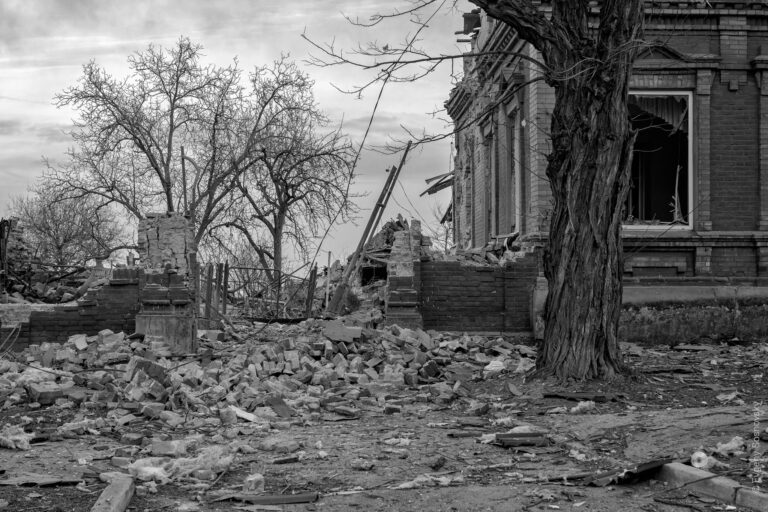
Grandmother was lying in bed and she had the sky above her head, because there was no ceiling. In such conditions, they remained for two weeks, while we spent these two weeks in another place. On the morning of March 20, I went out into the yard at about seven in the morning and saw that all the buildings around us were already almost black and some apartments were on fire. Only our eighty-fifth and neighboring eighty-third survived. However, the same day, at about two o'clock, the shelling began again. We were all in the apartment because it was not safe outside. When the shelling started, we hid in our corridor. It was very loud, we thought that these shots were right next to us, it turned out the Russian tanks were rolling around our neighborhood. They stood near the previously shelled No, 66 school and fired in the direction of Azovstal from there. They fired directly from our residential quarter with many residential buildings. From that shooting an apartment caught fire somewhere on the fourth floor, the residents of the house began to panic and some said that they had to leave the house, because everything would burn down. Someone suggested, "Let's try to put out the fire." But suddenly a group of Kadyrovites [Chechen fighters] broke into the building. I lived on the ground floor, so they broke into my apartment first.
They started kicking people out of their apartments and gave them almost no time to take anything with them. We were forced to evacuate the apartment. We said that we had injured children and a woman, but this did not stop them.
They kicked people out of their homes, and the only thing we could take were our documents and my bag with cameras and photo archives. It was important for me to save the photos which I shot in Mariupol from the 2012 to 2022. One can buy new clothes, but I needed to save the archives. The soldiers stood next to my door. We had food in the basement, but we were kicked out of the house despite the fact that the wounded woman hobbled slowly on two sticks. Suddenly she was forced to run, "Run out of the house!" Nobody was interested in anything. We couldn't get very far. Most of the residents went to quieter areas to visit relatives and friends, and we went to a neighboring building and asked to stay in the basement with other people. We were let in and given a room. We were told that other people lived there before us: there were some primitive beds, rags, a sheet and other things that could be used to sleep on. There we were, the five of us. Thirty minutes later we heard terrible female screams at the entrance. The woman shouted, “Why did they come out? Why did they leave?” She kept repeating only one phrase, “Why did they come out?” We realized that something terrible had happened because she was screaming very loudly. Later I learned that a young guy, Denis Medvedev, came out of the basement to check if any floor was on fire. He and his father had keys to different apartments, because the residents that had left gave them their apartment’s keys in case of a fire, so that they can come in and do something.
He ran outside to see which floor was on fire and was shot in the temple by a sniper. I assume it was a sniper because there was only one shot and it was very accurate.
The father rushed after him, but fell near, the next shot killed the father. There was a pool of blood right in front of the entrance, there they were side by side and the two of them remained there for about a week. Nobody carried them out. The woman who screamed was the mother of the young men and with her she also had her daughter-in-low with a one-year-old little girl. The three of them remained, and the two men were killed. This family came from the East. When the shelling began, they moved once more, because it was believed that it would be calmer in the city center. They lived on the eighth floor, but during the shelling it was impossible to be on the upper floors, therefore, they were always in the basement and next to us. We helped them the best we could to build a fire and with some other things, but they also helped us as best they could. They eventually managed to escape through Russia and now they are in Vilnius. As far as I know, they got help in Vilnius.
The next morning, I woke up and thought that I needed something to feed the children. I thought, maybe those Kadyrovites left our house: I’ll go and get the food from the basement, in case they didn’t take it. However, when I went out, I saw that the house in which we had lived for more than twenty years was no longer there. Although it was standing, it was completely black with empty eye sockets of empty windows. I went to the house and, approaching the entrance, I saw a charred corpse nearby. It was already impossible to recognize the body, because nothing was left of the face. Most likely, it was one of our neighbors who ran out of our entrance when the fire started but, probably, could not get too far.
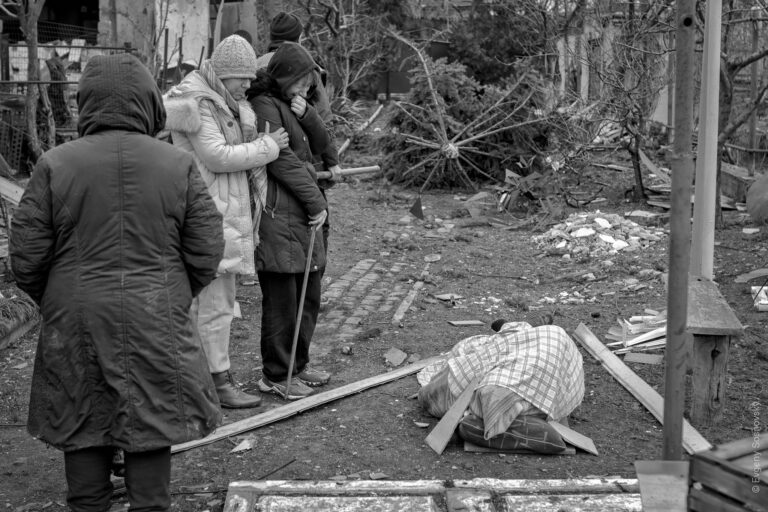
I entered my apartment, but it was practically gone: only bare walls left, a thick layer of dust, nothing left of the furniture or anything else that was in the apartment. Some pieces of iron were sticking out some places, but there was nothing left at all. Well, some dishes and ceramics were there, but everything was burned, cracked, otherwise, no clothes, no furniture, no books. Everything burned down. The books looked very strange, opened books seems to have survived, but when you touched them, they crumbled. I thought that something was left in the basement, but everything burned down there as well. There were some cans and glass jars, but they fused with each other. The fire was so strong that almost everything that could burn was burned. Thus, we were left with practically nothing. Only what we managed to grab with us was ours.
There was a bedridden grandfather on the seventh floor. The family couldn't take him away when they ran, and when the children returned, they saw that he had burned to the ground, like in a crematorium.
There was nobody to bury. Another person, named Nikolai, jumped from the sixth floor and died. This is what my neighbors told me. In the cellar near the house, I found half a pack of butter and some walnuts. I collected these nuts and chopped them for the children: this is how we had our first breakfast. We gave the children a spoonful of butter then nut, butter and nuts, butter and nuts, that's how they had breakfasted that morning. I knew we couldn't survive like that for long. I left the basement to continue looking for food. I went out to Metallurgists Avenue. There was a passage between the two houses. There, too, lay a charred body, and from the sixth floor hung a twisted rope made of sheets, blankets, curtains and some rags. Someone went down here and I hoped they had succeeded. Metallurgists Avenue already was such a spectacle, as they say, "Armageddon". There were some stones, broken wires and fallen trees. Further, at the intersection of Metropolitskaya and Metallurgov streets, there was a broken tank. It seems to be Russian. I went further to the central market: there was a family bakery there, but I saw it was smashed to the ground. All the doors and windows were broken, but I saw some kind of candies on the floor. Well, I went in and took them.
On my return I faced a muzzle of machine gun pointed at me. There was a group of Kadyrovites again and one of them shouted: “Come here quickly! What are you doing here? Give me your documents and the phone!”
I said, "I don't have a phone." I showed him the documents and said: “I am here looking for food, because I have two wounded children and I need to feed them.” He said, "Take off your clothes!" It was quite cold in March, but they undressed me and looked to see if I had any tattoos or something else. I don’t know what they were looking for, but they didn’t find anything and said, “Get dressed and get out of here so that we don’t see you here again.” I went further to another apartment near the Drama Theatre. We didn't live there, but there was water. I thought, at least I’ll take water, maybe I’ll find some old food there. This house was also bombed and burned, but I took some water and went back to the basement. There again I saw the Kadyrovites and the same thing started over again,“Stop! Go here! Run! We have orders to fire without warning. Are you seeking death for yourself? Why are you walking here?”
I said again that I have to feed my children, they are injured, they need something to eat. He then said, "Take off your clothes, I'll check you." I answered, "Your guys just checked me on a parallel street." He replied, “Well, well, if they checked you, then show me your hands.” They checked my palms for traces of gunpowder or whatever they were looking for. They let me go and said, if anyone asks, to say that Sifula has already checked me. There were no more adventures on my way, if it can be called adventures at all. However, there was nothing to eat: only the next day the inhabitants of the house where we were hiding noticed that we had no food and brought us a pot of hot soup. They fed us and later they brought us some porridge. A little later, near the surviving house, the DPR (“Donetsk People’s Republic”) set up their field kitchen and gave food to the residents.
I, despite my views, was forced to go to them, because I had no other choice. I went to them and said that I needed to feed the children. There was one more or less adequate cook who, as I understood, did not want to fight. He was forced to go into the war, but he was OK. When he heard about the children, he gave me condensed milk, stew and cookies. Many people from the DPR were mobilized by force, even those who did not sympathize with the separatists’ cause, but could not leave Donetsk. The nurse who bandaged our children confirmed the same thing. When the DPR people saw that our small children were wounded, they immediately suggested, “We will take them to Donetsk, to the hospital.” I said, “No, not Donetsk, we will heal on our own.” They said, “No, they need to be taken to Donetsk.” I replied, “No, there is their mother, she decides what to do.” Then they agreed with us.
The nurse also told me, “I am not a military person. I worked in a hospital in Donetsk, but they threw us here, to the front, like meat.” They were used as meat, followed by the Kadyrovites, who were already performing the function of a cleansing operation.
There was another unpleasant episode when they tried to hand me over to the DPR. There was a man in our house and he turned out to be a Putin supporter, Once, when my wife and I were leaving the basement in the morning, he called me and said, “Evgeniy, come here, they want to talk to you”. Next to him were, it seems, three DPR soldiers. As I understand it, they were representatives of the MGB (Ministry of State Security) or something like that. Some kind of special unit, because they went around looking for the SBU (Ukrainian Security Service) officers or the ATO (Antiterrorists Operations) officers, or other pro-Ukrainian activists. They were interested in finding them and he, without thinking twice, handed me over to them. He told them that I walked around taking pictures, that I was a correspondent or a journalist. They started asking me, “Come on, correspondent, what kind of pictures did you shoot here?” I pretended to be a simpleton and answered, “What did I film here? I photographed people, how they cook porridge on a fire. I didn’t take pictures of houses, just pictures of people for keepsake, but everything perished in fire. If you don't believe me, you can go to my house and see the burnt cameras.”
I really had two burnt down photo cameras in the basement, but there was also a third one. It was partially damaged, but it still worked and stayed with me in the basement along with the archives. I thought that if he went to the basement and started checking, he would have found a lot of photographs, which I called suicidal. Azov was there, our marines, many images I had been filming since 2014. There could be big problems even over the photos with Ukrainian flags. Therefore, I was very worried when he began to push me, “You're lying, tell me the truth!” He started shouting “Glory to Ukraine” and waiting for me to answer “Glory to the Heroes”.
Then he let me be, but said, “Did the Chechens cut your heads? No? We will do it.”
Fortunately, at that time everything worked out, but the next day we decided to leave the basement were we sheltered for a while. I have not yet mentioned another small episode: eight days after the shelling, when the children and their mother were wounded, the grandmother came to us and said that the grandfather, after being wounded, lived for another eight days and died with no medical help. She couldn't even bury him because there was very heavy shelling and street fighting in the area. The military ran around the yard, shooting, she was very scared, but she could not leave her husband. On 27 March, we were able to bury him in the garden near the house. After the incident with my neighbor, who betrayed me, we decided to return to the private sector, to my grandmother's house. Out of the three houses, I tried to constract one, more or less normal: I patched it up the best I could and restored the roof so that we could live in that house. There we lived under shelling that continued every day and every night. They bombed Azovstal with everything they had. There was no air defense in Mariupol, and this is perhaps the main reason Mariupol could not be protected. If it was only ground assault, I am sure that our military could have given them a worthy resistance, because we had strong long-range artillery at Azovstal.
At first, our troops kept the Russians at a distance from the city, but later, when the Russians launched aircraft and began to bomb Azovstal, when missiles flew and we had nothing against them, the situation changed.
We saw Russian planes circling all day long over Azovstal, how the planes came into position, how they launched rockets, dropped bombs on parachutes and how everything exploded. It was every day and every night ... During that time, every other day, my wife and I were dressing children’s and their mother’s wounds. I walked through the broken-down volunteer warehouses not far from us and looked for bandages, syringes and medicines. At the end of April, before Easter, my wife heard on the radio that there was a humanitarian corridor from Mariupol to Zaporozhye. We had an old radio that received Ukrainian programs on medium waves and so, we began to receive some information, because before that we did not know at all what was happening in Ukraine. Our daughter lives in Kyiv, but the communications with her were also very difficult. Sometimes it was possible to call using DPR operator “Phoenix”, but it was very problematic.
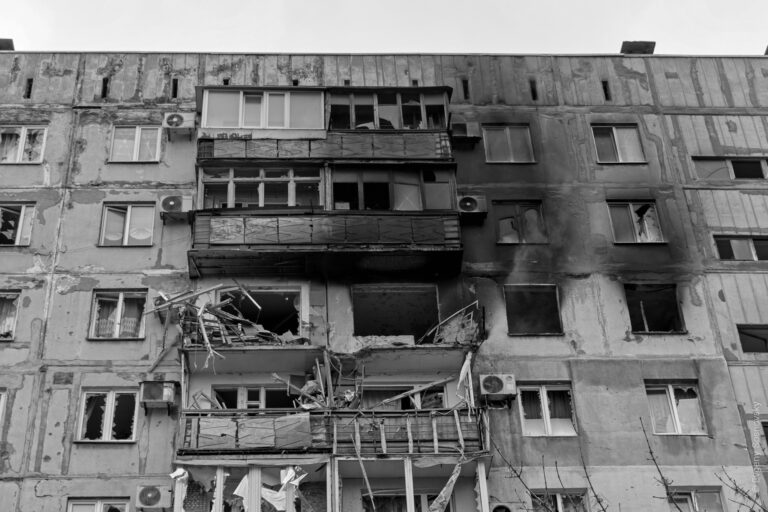
When we heard that there would be an evacuation, we quickly packed up, put my grandmother in a wheelchair and drove to Port City. We were told that there was a green corridor and that it was there that the evacuation would take place. We came on the first day, but we stayed there until half past six in the evening. It was very cold, our grandmother was freezing, we covered her with everything we had. The bus never came that day, but we could no longer return home, because there was no return bus. A neighbor drove us to that point and we could not call him as there was no connection. However, my sister once lived there, and she said that the neighbor had a key to her apartment, just in case. We went there, found her neighbor and got the key. We stayed in that apartment for another week. Three times we tried to leave for Zaporozhye by evacuation buses. There was this one moment. We arrived at the evacuation point, about two hundred people were standing there, then an armored personnel carrier pulled in, then another car and operators jumped out of it and filmed us while an alarm signal started and somewhere in the bushes an amplifier of a missile strike was sounding. Orders were given to everyone to go to a shelter. They decided to create a movie where people seem to have gathered for evacuation and the Ukrainian army fired at them. However, people did not want to run away: they stood and stood there.
They tried to disperse us, “Don't you hear the alarm?” We said, “Yes, there is a market nearby and we don’t see anyone running away. Why are you driving us from here? Will they shoot specifically at us?
But still, little by little, people began to disperse, and they filmed it all to show that the evacuation was thwarted by the Ukrainian military, and they, seemingly courageous, repulsed the missile attack. We were unable to leave through that root and we started looking for another way to escape. We found a private carrier who told us, “400 dollars per person and mandatory filtration.” There was a problem with filtration, although it could also be completed for $100-200. However, I might not have passed it, because I was known in Mariupol as a pro-Ukrainian photographer. They knew what I was filming. In general, if you just type in Google “Evgeny Sosnovsky, Mariupol”, you will immediately find the information about me. By that time, the children had closed my Facebook page and cleaned up everything they could, but it was impossible to hide a lot of other information on Internet. We started looking for other options and finally we were helped by people who agreed to take us to Zaporozhe without any filtration.
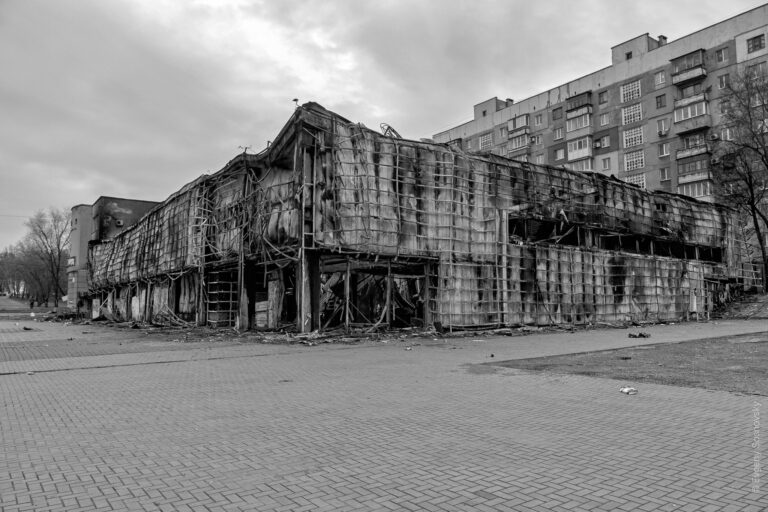
We left on the thirtieth of April through Pologi. We thought to go through Orekhov, and from Orekhov to Zaporozhye, but that day we did not manage to get to Zaporozhye, because active hostilities were going on there, and the rashists told us to return to Tokmak. There were a lot of checks on the road from Mariupol to Tokmak, about twenty checkpoints: at each one they checked documents, looked at luggage, but to my delight they didn’t look very closely. If they started checking what I had on my hard drives, it could have been very unpleasant. Fortunately, we reached Tokmak without tight checks and there we stopped at the church on Shevchenko 8 where they helped the migrants. We were received, fed and given places to rest.
For the first time in two months, we saw light, light bulbs and tap water. I could not get enough of bread: all evening I was sniping pieces of that bread, because it was so fresh and tasty.
We were there for three days and heard the announcement again that there would be a convoy from the UN that would take people out of Azovstal. By the way, we got the Internet in Tokmak, and I was able to prepare thoroughly for the checks: I transferred all discriminating photos to an external drive and encrypted them there. I thought that there would be no IT specialists at the checkpoint who could decipher it right at the checkpoint. As I said, they announced the departure of the UN buses. We gathered again and were taken from the church to the departure point for free, but again we stood for almost the entire day and the buses did not come again. On that day, the buses did not leave Mariupol at all, because the DPR people have their own rules and no agreements have any meaning for them. We returned to the refuge for migrants, and the next day we went by a bus-transporter. Approximately forty people paid the driver 2,000 hryvnias per person. We left in the morning, around seven. We drove for a long while because there were many checkpoints and there were checks at every checkpoint. The checks were especially hard for young guys. I was lucky because then I had a beard and, apparently, my appearance did not cause too many questions. They took me out of the bus only once, undressed me and checked for something.
The younger guys were checked at every checkpoint and very often they were offered to pay money, they were told, “You understand that if we want to find something, we will find what we need, even if you don’t have it.”
They latched onto one who had this SMS, “Thank you for the purchase. Glory to Ukraine!" Such SMS is common in our time, he did not even know what and where he bought, but when we got to that point, the phone operators of Vodafone and Kyivstar started to work and we began receiving phone messages. Because of that SMS, they bothered him, but nothing happened as in the end he paid them five hundred hryvnias. At several checkpoints they collected regular tax rates: five hundred hryvnias, five hundred hryvnias and five hundred hryvnias. When we reached the last checkpoint at the exit from Vasilyevka and stood in line there, we saw a column of UN buses: about sixty buses, but they were almost empty. Only five buses at the head of the column were about half full. There was an ambulance and a lot of cars behind them.
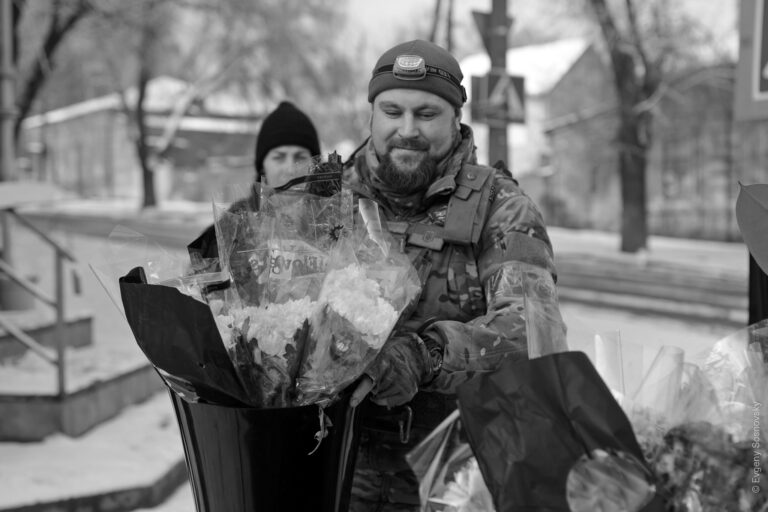
They arrived at the checkpoint and it turned out to be the same column we were waiting for earlier, but did not linger long enough. An official from Ukrainian Ministry of Emergency Situations travelled with the column. He boarded our bus and said, “Maybe you need water or something else?” We responded, “Yes, please, if you have it.” He brought us some water and handed out sweets to the children. I told him, “Maybe you can take us to your buses, look how much free space you have.” He replied, “I would love to do it, but you see, I don’t decide anything here, everything here is decided by them.” This column of buses left empty for Zaporozhye, but the exit was closed right in front of us. They put road blocks and women started crying and yelling, “They want us to return back, let’s go and beg them on our knees to let us through.” However, they were also corrupt, one local resident persuaded them to let us through and every car and bus paid 1,000 hryvnias. We were taken to another checkpoint and got through it without any checks. Perhaps this saved me from additional scrutiny and we were able to leave this last checkpoint and enter the territory of Ukraine. After that there were only Ukrainian checkpoints and we reached Zaporozhye where we were very well received and they helped us in any way they could. Later I went to Kyiv with my family.
What do you plan to do after our victory?
It all depends on when the war ends. I have a little time left before retirement, only two years, but I hope that I will work as before, because I had a job and a hobby: photography, theater. I am even trying to work now in Kyiv, take pictures, create theatrical performances with my colleagues. I hope to live a normal comfortable life, but I'm not sure that it will be in Mariupol. I just can't imagine when it will be liberated. I am sure that it will happen, but if our army fights for it, nothing will remain of the city at all. Russians almost destroyed it when they captured it, but when they leave Mariupol, they will destroy it completely. Furthermore, it is very difficult to live in the city knowing that this is a city of bones and blood. This is my hometown near our beloved Sea of Azov to which I very often ran in the morning to breathe fresh sea air ... Now this is no longer the case. I can’t imagine that I can go back there, because a lot of dark events are now connected with it. You may have heard about the diary of an eight-year-old Mariupol boy who wrote that the city of Mariupol had died. Yes, it died and can only be resurrected in fairy tales. You can restore everything, but it will not be the same city of Mariupol. Perhaps it will be even better, more modern, but it will no longer be the city in which I lived ...

